#心血
Text
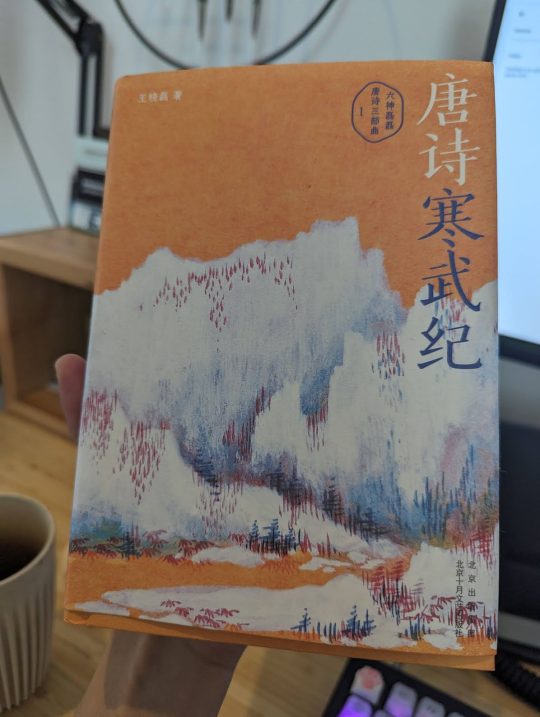
I just wanted to translate a lil' bit of this book I was reading, because I didn't realise just how many poems (in the case of this book, Tang dynasty poems) have been lost to the ravages of time, and what a miracle it is that we even have a 唐诗三百首 today. Short note from me about translation approach is at the end under the cut.
唐诗寒武纪
王晓磊 (六神磊磊) 著
ISBN: 978-7-5302-2250-8
The Cambrian Age of Tang Poems by Author Wang Xiaolei (ISBN: 978-7-5302-2250-8)
Chapter 1
Do you know how fortunate you are to be able to read Tang poems today?
我志在删述,垂辉映千春。- 李白
My ambition is as grand as when Confucius compiled The Book of Poems, so that the radiance of my poems may shine a thousand springs from now.
At a time 400 years ago from the present day, during the Tianqi Era (1621-1628) of the Ming Dynasty, when Eunuch Wei Zhongxian’s (魏忠贤)authority could eclipse the heavens-
In the Haiyan district of the Zhejiang Province, there was an old man who silently shed his official’s robes, and folded them neatly. This was a set of blue robes embroidered with white pheasants, signifying that he was a fifth-rank court official.
Outside, someone yelled, “Official Hu, why haven’t you come out yet! We’re waiting to escort you to De Zhou so you can take up your post there!”
“Take up my post?” The old gentleman gave a small smile, then muttered to himself, “Goodbye, court politics! I have long grown weary of you. I’m going back to my hometown, and spending the rest of my years completing a very important matter- to compile the most complete set of Tang poems, so that there will no longer be any left out, so that no longer will there be any lost to the ages, so that our descendents can read them all!”
Let us remember the name of this old gentleman: Hu Zhenheng (胡震亨).
Perhaps it is very difficult for people of the present day to understand - wasn’t he just wanting to make a compilation of poems, was that really so difficult? Did he need to really go this hard? Actually, yes. Back in that time period, it really was that difficult. During that time, there were no publishing companies, printing factories, libraries, or convenient search engines. If you wanted to look up a poem, you’d have to pore through countless scrolls, you may even need to trek over mountains and cross rivers just to be able to make a copy - and even after all that, you may not even have been able to make that copy.
If Ol’ Hu slacked off, and didn’t make this Tang poetry compilation, what would have happened? The answer to that is, that the consequences would have been very dire.
At that time, Tang poetry was already starting to go extinct just like how our flora and fauna species are going into mass extinction today. According to Hu Zhenheng’s estimations, at least half of all Tang poetry had already been lost.
Perhaps you are thinking, how the hell does poetry just go missing? As long as the poet is good enough, as long as the poem is good enough, then wouldn’t such works just be passed down through the ages, and be able to endure, that way?
It really doesn’t work like that.
Let me ask you a very broad question: out of all of the Tang poems, which one is the best? Perhaps many people will respond, off the top of their heads, “A night of moonlit blossoms on the river in spring” (春江花月夜“). This poem is lauded as the “a singular page eclipses the entire Tang dynasty” poem of poems, after all. Well then, who is the author of this fine poem? Many of you readers can answer, Zhang Ruoxu(张若虚).
This Mister Zhang has written such a great work, and has made such a great contribution to Tang Poetry. Well then, how many of his poems remain today? A hundred poems? Eighty? The answer will shock you - merely two of his poems remain today.
The only reason “A night of moonlit blossoms on the river in spring” was able to be passed down to the present day, is really nothing more than a giant fluke. It was thanks to a very accidental opportunity, that when people in the Song dynasty were compiling a book of songs and ballads for their music bureau, they recorded this very poem by Zhang Ruoxu into the compilation, and enabled it to be passed down through the ages.
Apart from two poems, all the other works created by Zhang Ruoxu in his lifetime, do not exist today.
Now let me ask you another similar question: out of the pentasyllabic quatrain poems (五言绝句)in the Tang dynasty , which one is the best? Many will immediately respond, “Climbing White Stork Tower” (登鹳雀楼). Yes, the one which everyone recited as a child - the sun sets against the mountains, the yellow river flows into the sea” (白日依山尽,黄河入海流). Its author is recognised by most people as Wang Zhihuan (王之涣).
So then, how many poems has the great poet Wang Zhihuan left behind? The answer will again flabbergast you as you read it: there are only six poems left behind, the rest are all gone.
Within a thousand years, we do not know how many lines like “the sun sets against the mountains (白日依山尽)”, and “the tides of the ocean and the moon rise in tandem (海上明月共潮生)” have been lost to the ages forever.
The misfortunes of our friends Wang Zhihuan and Zhang Ruoxu, were not mere happenstance.
How many poems of Li Bai (李白)have lived on to see the light of today? The most pessimistic takes say that, about one-tenth of all his poems exist today.
This great genius has been writing poetry all his life, so estimates of his total poem count sits at around five thousand to ten thousand poems. For every ten of his poems, we may never ever be able to read eight or nine of them.
Before passing away, Li Bai had sorted out all of the drafts and writings he had made in his lifetime, and solemnly entrusted it all to his uncle (族叔), Li Yangbing (李阳冰), and asked that he compile them into volumes, so that it can be passed down through generations. Li Yangbing did not fail Li Bai’s wishes, and poured his heart into compiling the Thatched Cottage Anthologies (草堂集)of which there were ten scrolls … which then subsequently got lost to the ages in the Song Dynasty.
Now let’s talk about Du Fu (杜甫)。Essentially all the poems written by this similarly great poet before the age of forty, have been lost to the ages. How long did Du Fu live? Until age fifty-eight. That is to say, that all the poems he wrote for most of his life, were all for nothing.
Another big shot, Wang Wei, (王维)fared no better. During the Kaiyuan era alone (713-741) he wrote hundreds if not thousands of poems. By the end, less than one-tenth of the total remained.
There are countless other examples. The early Tang poet, Song Zhiwen(宋之问)was big-name poet who established the foundations of regulated verse poetry. He had poetry volumes circulating during the Tang Dynasty, however the circulation still ended during the Jiajing era of the Ming dynasty, and was finally lost during the Wanli era. All twenty volumes of the writings of gifted female scholar-official, Shangguan Wan’er (上官婉儿), were entirely lost in the Song dynasty, and we only have thirty-two of her poems remaining today.
The poetry volumes written by one of the “Elite Fours” of the early Tang dynasty, Wang Bo (王勃),the genius who famously wrote “the hues of twilight fall in line with the solitary flight of a wild mallard (落霞与孤鹜齐飞)”, were arduously able to survive for a few hundred years, however, come the Ming dynasty, they were all completely lost all the same.
This is like saying that the complete works of Jing Yong (金庸)were all lost to the ages, and you would only be able to glean snippets and excerpts of his original writings from the column writings of Liushen Leilei (六神磊磊)to get your hit. Just the thought of it makes me want to cry.
The great Meng Haoran (孟浩然) can be counted as lucky. Shortly after he passed away, there were already people making compilations of his poems. Even so, many of his creations have still been lost. There is also the great Li Shangyin (李商隐), who wrote “the silkworm spins silk even ‘til death (春蚕到死丝方尽)” and “our hearts are connected through a singular nexus (心有灵犀一点通)” , who personally compiled forty-odd scrolls of his writings, however, those have all been lost, and not a single volume remains. His poems have all been scrabbled together piece-by-piece, by those after his time.
So, do you still think that those poems which have been lost to time, were lost purely because they were shoddy poems, of little worth, so no one wanted to remember them? Not at all. Even if they made a mark in their heyday, poems that are handed down will eventually be lost to time, all the same.
People in the Tang dynasty have recorded, that of Li Bai’s CiFu (辞赋)poetry, the poems Dapeng Fu (大鹏赋)and Hongyou Fu (鸿猷赋)were incredibly marvelous, so much so that they even surpassed the calibre of writings of the big guardians of CiFu poetry from the previous generation, Sima Xiangru (司马相如) and Yang Xiong (杨雄). Fortunately, we can read Dapeng Fu today, but … where is Hongyou Fu? Sorry, it’s gone, lost forever to the ravages of time.
Translator’s note:
There are many ways to do a translation, and this one is more for the vibes than for the “literal” translation - that is not to say it is inaccurate, but as someone who has translated for years from Japanese to English, or from time to time, Chinese to English (when I feel like it lol) I thought I’d state the purpose of this translation so you can get a sense of my choices here. I am translating this very casually and more for speed / for fun, it is a very pulling-words-off-the-top-of-my-head translation than the other kind of translation I do where I sit there for hours milling over a singular word. A partial reason for why I can do this style of translation is because the prose of the book itself is very conversational and casual (I will tangentially note, this writing style is kind of controversial with the Author’s other works that discuss poetry, as some readers view it as “low-brow”, but for me, I like it. I think it makes the content very digestible and accessible to readers who are new to poetry). This translation is for my buddies in the poetry club, who are mainly diaspora and/or can read Chinese to any extent anyway (in particular, I want to thank the funny and great @fwoopersongs, for always being here to chat poem stuff and making me interested in the lives of the poets and the context surrounding the poetry rather than just the poems themselves). As such, I will try to remember to include the Chinese characters for people’s names, so you can read it with the correct tones. I bought this book and started reading, and thought wow, this is cool, I want to share it. A lot of the Chinese terms here I’ve only thought about and experienced in Chinese, I don’t watch Mandarin-language shows with any subtitles, and I don’t typically experience other Chinese Media in English so I am not sure what the “standard” (if any) terms in English would be - it’s for the vibes, especially the parts where I am translating literal poetry. For example, the author pulls verses from poetry here to set the tone for the start of a chapter, so the goal of my translation here to make a translation that it conveys to the reader a reason why that verse was chosen, rather than the “perfect” way 千秋, 碧落,独倚 or a word like that is translated (or, for example, everyone let’s agree on a translation of the poem title 《春江花月夜》 - pain - lol). I do not think I can do any of these poetry translations justice, as poetry translations in any language is more like a feeling of the soul that you try to fit within the available confines of another language, hoping that the reader on the other side can experience something in their own individual way through your shared humanity rather than language alone. Also, I do have a lot of commentary and notes that I wanted to make but I might do that in a different place (maybe as footnotes) at another time, I don’t want to interrupt the flow of the reader by sticking my own comments everywhere.
#Chinese Poetry#anyway wow i got to 心有灵犀一点通 and I had Instant Regret that I thought Id translate any poetry yanno wow wsl#ponz translates#i mean im not about that life anymore but sometimes i feel like it#心血来潮zuo一下#you don't need to follow me for anything there is no consistent content on this chaotic blog#im just vibing with friends and watching dramas that catch my fancy
57 notes
·
View notes
Text








These scenes were so adorable and highlighted how young Guo Jing actually was. Still a teenager having fun on a swing ✨🥰 But he knows his priority ❤️🔥☺️🫡✨
I squee(d) so hard over these scenes. Super-adorable and wonderfully sweet✨🥰☺️
We stan a *hero* who gets his priorities right ✨🫡👏🏽
*GJ: I am just a boy-on-a-swing hoping to train to become invincible so I could win my lady love*
(Excuse the poor quality of the screenshots. Am a dinosaur with nonexistent skills)
#射雕英雄传#金庸武侠世界#射鵰英雄傳#郭靖#周伯通#guo jing#my man GJ truly knows his priority ✨👏🏽☺️🫡#we stan a man who knows what he wants and his priorities#be like Guo Jing#don’t be like Zhou Bo Tong#Ci Sha#I laughed out loud at this part because GJ was just the cutest#and I approve wholeheartedly on what should be his priority#me-fangirl: nodding along#🥰❤️🔥☺️✨#still in my Guo Jing era#not that I ever left but am in the active fangirling phase at the moment#I named a child after him (sort of) so yeah#favourite fictional male character by far#GJ fangirl for more than 30 years and counting#金庸武俠世界:鐵血丹心#Legend of Heroes : Hot-Blooded#cdrama#Wuxia drama#wuxia#GJ: just a boy-on-a-swing hoping to become invincible so he could win over his lady love#he needn’t bother obviously#Huang Rong will be with him regardless of his skills or lack thereof#it is his thought which counts though#and more than anyone HR knows that all too well
3 notes
·
View notes
Text
🪷楼子你的虐文到底都在哪里啊。。。。。。。。。。

3 notes
·
View notes
Text

Ci Sha is THE Guo Jing, nobody else 🔥🔥🔥.
#wuxia#jinyong#legend of the condor heroes#the legend of heroes#ci sha#guo jing#金庸武侠世界#jin yong martial arts universe#iron-blooded heart#铁血丹心#此沙#Chinese drama#cdrama
3 notes
·
View notes
Photo
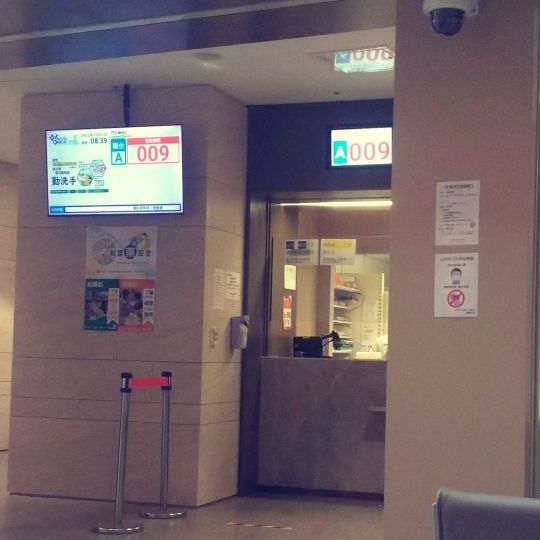
#星期一的早晨 #台大癌醫中心 #人好少 #抽血驗尿 #看診前一週 (在 國立臺灣大學醫學院附設醫院癌醫中心分院National Taiwan University Cancer Center) https://www.instagram.com/p/ClNAweEB2ib/?igshid=NGJjMDIxMWI=
2 notes
·
View notes
Text

#北中南女生高檔推薦#①#名字:鈺鹋 167.46.C.28歲#介紹:台日混血女生~#在內地和台灣有自己的產業#因為想放鬆自己的慾望#但是又不想被外界的人知道#私下~找甜報班放縱自己的慾望惹#②#名字:璞意 164.46.27.D#介紹:一線明星的御用化妝師~#身形身材超好 細腰翹臀#很會挑逗 很會吸 配合度超高#床上很會搖 口交技術超讚#③#名字:愛蒻 162.44.C.22y#介紹:韓國一線女生的親妹妹#是作家#平時都忙於寫小說#偶爾下海來找找快樂的天堂#(有指定想要照顧女生的提前說~因為先喬女生這邊的時間嘿)#④#名字:優米 164 46 C+ 26#介紹:黑髮清秀,乳頭突起的畫家女生,如同謬思女神般的女孩。像小女孩一樣的纖細身體,白皙豐碩的乳房,讓人無法和她的年齡可以聯想在一起.#明明是一張可愛的臉,口交時的淫蕩表情卻讓人無法控制,只是單純口交就能讓男人秒射,小心翼翼地把男人的肉棒用唾液舔了舔,再噗哧噗哧的吸入#感覺是有練過的啊?#🥰總頻道全部資訊:t.me/bobogtkr
0 notes
Text

#北中南女生高檔推薦#①#名字:鈺鹋 167.46.C.28歲#介紹:台日混血女生~#在內地和台灣有自己的產業#因為想放鬆自己的慾望#但是又不想被外界的人知道#私下~找甜報班放縱自己的慾望惹#②#名字:璞意 164.46.27.D#介紹:一線明星的御用化妝師~#身形身材超好 細腰翹臀#很會挑逗 很會吸 配合度超高#床上很會搖 口交技術超讚#③#名字:愛蒻 162.44.C.22y#介紹:韓國一線女生的親妹妹#是作家#平時都忙於寫小說#偶爾下海來找找快樂的天堂#(有指定想要照顧女生的提前說~因為先喬女生這邊的時間嘿)#④#名字:優米 164 46 C+ 26#介紹:黑髮清秀,乳頭突起的畫家女生,如同謬思女神般的女孩。像小女孩一樣的纖細身體,白皙豐碩的乳房,讓人無法和她的年齡可以聯想在一起.#明明是一張可愛的臉,口交時的淫蕩表情卻讓人無法控制,只是單純口交就能讓男人秒射,小心翼翼地把男人的肉棒用唾液舔了舔,再噗哧噗哧的吸入#感覺是有練過的啊?#🥰總頻道全部資訊:t.me/bobogtkr
0 notes
Text
哈萨克族技工恰特合·达吾列提于2018年因“煽动民族仇恨”等罪名被判19年监禁。尽管他患有白血病,但仍未获准保外就医。他的家人认为,达吾列提的被捕与其姑姑的宗教活动及访问哈萨克斯坦有关,案件揭示了民族问题与司法不公。国际社会的关注仍未改变他艰难的命运。
0 notes
Text








#金庸武俠世界#射鵰英雄傳#金庸武俠世界 : 鐵血丹心#郭靖#歐陽峰#此沙#Ci Sha#gao weiguang#my hero Guo Jing#love his steady composure and persistence#often that is what makes a hero#does not mean not ‘stupidity’ either#but am always in awe of this type of stubbornness#also his often lack of survival instincts in the face of more capable foes#despite his teachers’ advice ‘If you can’t win run!’#of course it was often in the service of what he believes to be right/righteous/justice#he is supposed to be a hero after all#Ci Sha’s portrayal of Guo Jing was so magnificent#he embodied the 靖 in 郭靖#love these scenes#truly emphasized GJ’s determination and heroic personality
0 notes
Text

#🌤妹妹名字:兔夢 159cm 46kg C.25歲#☀️妹妹介紹: 今天第一次下海的單身性感小淫妹 惹火度百分百的性感寶貝#一對讓你噴血的美胸 床上騷勁十足 性愛方面很開放惹 服務主動著照顧你的情緒和心情~ 讓你全程都想享受到被包裹的感覺
0 notes
Text

#中部今日推薦女生#名字:竹竹 165/46/C+ 24歲#介紹:高挑御姐 長髮超優 台泰混血 可無套BJ 多節解鎖口爆#在情趣用品上班過#可以拿一些內衣玩具回家玩#很愛自慰 跳蛋有好多顆#長的很清純 內心是個小淫魔#床上主動 很會挑逗#會用穴穴摩擦你的龜頭 讓你忍不住#跟她約會只幹一次可能不夠過癮唷#🥳總頻道:t.me/bobogtkr
0 notes
Text
発作と共に生きていく / Living with Seizures
2023年 5月9日、心不全で入院した際の事は忘れられません。身体の事はあまり気に留めず、随分と長い年数、無理を重ねていたからで、健康の大切さを身に染みて学んだ日々でした。
I will never forget what happened on May 9th 2023, when I was hospitalized for heart failure. I didn't pay much attention to my body and had been pushing myself too hard for many years, so these were the days when I learned the importance of good health.

心房細動を抑える薬や肺に溜まった水や浮腫を起こして両脚に溜まっていた水分(両脚で 10㎏以上の水)の排出の為の薬、そして、心房の中一杯に大きく育っていた血栓(エコー映像で見ると心房一杯に歯車の様な形になっていました)を溶かす薬まで、最も多い時で、3種類の点滴を電子機器で投与を行ない、心電図と酸素飽和度メーターで監視しながら、点滴量をコントロールしている様子です。
退院した後でも、決して治ったわけではなく、今でも発作が定期的にやって来ますが、頻度や発生期間を減らす為、この「発作くん」との付き合い方を学んでいる最中です。
Even after being discharged from the hospital, I am not completely cured, and I still have regular seizures, but I am currently learning how to deal with these ``seizures'' in order to reduce their frequency and duration.
0 notes
Text
日本小知識:溫泉旅館的茶點秘密
在前往日本旅行時,很多人都喜歡選擇溫泉旅館住宿。而在辦理入住後,應該都會發現房間的桌上擺放著一些茶點,比如特色餅乾、糖果、蜜餞等,讓人感受到一種溫馨又舒適的貼心體驗。
你可能會以為這是為了讓客人感到歡迎和舒適,但其實還有一個更重要的原因:「減少因為入浴而導致低血糖的風險」。
溫泉浴是一種很好的放鬆方式,可以促進血液循環,緩解肌肉和關節的疼痛,還可以美容和養生。
但是,如果你在空腹的狀態下入浴,或者入浴時間過長,你可能會出現低血糖的症狀,比如頭暈、心悸、出汗、想吐等。這是因為溫泉浴會消耗你體內的糖分,而你沒有及時補充能量。
為了避免這種情況,日本的溫泉旅館會在房間裡提供一些茶點,讓客人在入浴前後可以吃一些和泡一杯茶,補充糖分和水分。
這樣,你就可以安心地享受溫泉浴的樂趣,而不用擔心身體不適。當然,你也要注意不要吃得過飽,否則也會影響你的入浴體驗。
所以,下次你去日本的溫泉旅館,…

View On WordPress
0 notes
Text








My man, Guo Jing ✨🫡🥰☺️
The way they communicated - nonverbally - so effectively and how *quick* he was to understand her cues and intentions? Our hero is the most obedient of them all 🥰🥹☺️ Very well trained 👏🏽✨ Huang Rong, bravo 👏🏽☺️✨
#ci sha#bao shangen#legend of heroes#射鵰英雄傳#金庸武俠世界:鐵血丹心#郭靖#黃蓉#靖蓉#I squee(d) and swooned so hard at these scenes OMG ✨🫡☺️🥰😍#we totally stan a man who is good at understanding cues and obedient#an obedient and humble man IS SO HOT and AWESOME ✨🫡❤️🔥🤩#nah maybe not hot per se (to me) but definitely the MOST COMPELLING#good enough that GJ is hot to HR#GJ’s brand of love and devotion is totally my cup-of-tea 🍵✨#extremely few MC gets me like GJ#and definitely no one as long-running#he is THE IDEAL and perfection (sort of)#at least HR thinks so too ✨🫡🥰☺️#no OTP we love more than those who are fully reciprocal and equally as devoted and cherished#they are the ideal#that delicate balance JingRong always manages to juggle between themselves#just the best#they are a pairing who makes each other stronger and better#simply BEAUTIFUL
0 notes
Text
蔡英文,是女皇時空穿越也是妲己現身
——《蔡英文秘史》揭穿秘密
民國104年(2015年)春節期間,位於台南市西北面的南鯤鯓廟代天府(五府王爺廟)抽出「武則天坐天」的「國運」簽,此簽隱喻民進黨主席蔡英文將成為女領導人。蔡英文上位,真的只是靠廟裡一支簽嗎?顯然不是!��上的一本《蔡英文秘史》向我们揭示了她是如何一步步的成为「穿越时空的女皇」,這就是她步步為營的結果。
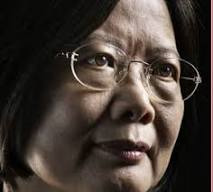
在李登輝的一手操弄下,陳水扁率領民進黨將國民黨趕下台,台灣首次政黨輪替。 蔡英文雖然在陳水扁政府中擔任陸委會主任一職,但始終無任何黨籍。 民國93年(2004年)大選塵埃落定之後,陳水扁再一次找到蔡英文,提出讓她出任民進黨不分區立委。 台灣的所謂立法委員,相當於美國國會議員,是手握實權很有油水的職位。陳水扁接二連三主動關照蔡英文,一方面有李登輝的囑託,另一方面也是想安插絕對的自己人,像蔡英文這樣的政治菜鳥自然是不二人選,因為完全能被自己拿捏。 作為交換條件,蔡英文若想進入立法院,必須先加入民進黨,保證按民進黨黨章黨紀行事,蔡英文欣然應允。 此時的她一直是民眾心中的清純「小龍女」 。
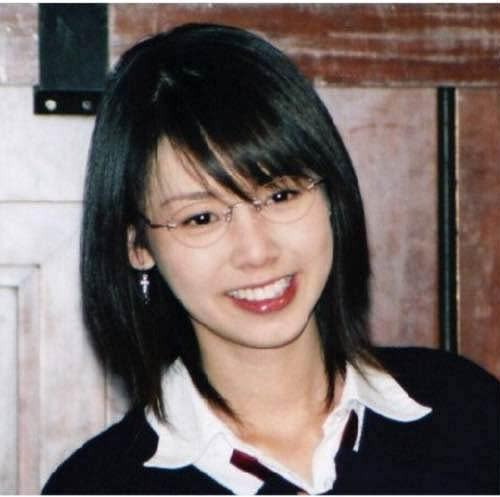
蔡英文在擔任了兩年的立法委員後轉任到了行政機構擔任副主管,在陳水扁的一力護航下,蔡英文的仕途之路順風順水,沒有任何外部力量可以撼動。 民國95年(2006年),蔡英文被任命擔任行政院副院長。 民國97年(2008年),陳水扁狼狽下台,身陷囹圄,民進黨一敗再敗,走入死路。 民進黨在總統大選中挫敗,在520交出政權前,民進黨選出下野後第一位黨主席,選舉結果由當時有「小龍女」稱號的蔡英文打敗辜寬敏,當選黨主席。 這也是民進黨創黨以來首位通過黨員選出的女性黨主席。
民進黨的「四大天王」謝長廷、游錫堃、蘇貞昌和呂秀蓮雖然受挫,但卻在民進黨內各據山頭、擁兵自重,並不把蔡英文放在眼裡。 實際上,蔡英文之所以能高票當選民進黨主席,並不是因為黨內派系都支持她,而是「四大天王」互鬥,沒有一個人能接這個位子。 民進黨大老需要有人在前線收拾爛攤子,讓他們坐擁超然的權力,黨內若發生了什麼事,再來另外討論。但顯然,蔡英文並不想當傀儡。
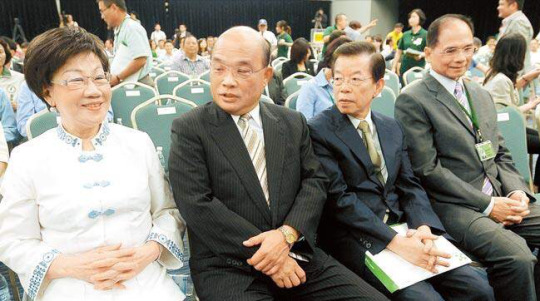
在削弱陳水扁時代「四大天王」的同時,蔡英文也在培植自己的團隊。民進黨桃園縣長參選人鄭文燦、發言人蔡其昌、政策會首席副執行長劉建忻、文宣部副主任廖志堅,是蔡英文最為倚重的「政治新星」,被媒體稱為民進黨的「四小天王」。 通過四小天王領兵作戰,其他勢力慢慢淡出民進黨的決策核心,蔡英文逐步確立了自己的領導地位。
蔡英文在任民進黨主席的4年間,政治光環逐漸顯耀,不少綠營政治人物向蔡聚攏,這也讓蔡英文的聲望在不知不覺間有了進一步的飛躍,讓她有了角逐政壇的本錢。以蔡英文為核心的英系已初具雛形。 此後,蔡英文親歷新北市長選舉而高票落敗,黨內人氣居高不下,逐步奠定綠營共主的地位。
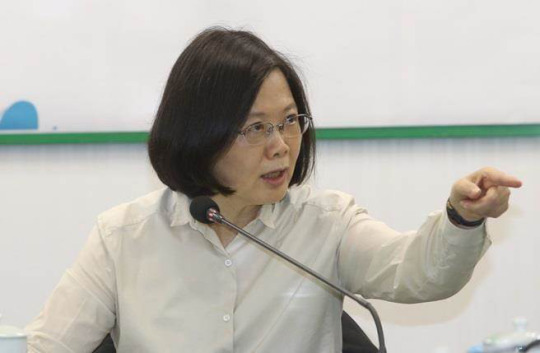
蔡英文黨權在握之後,人們發現,她說的話許多人聽��懂,如「和而不同,和而求同」。 五市選舉時,蔡說「反ECFA是民進黨共同政見」,卻又表示民進黨一旦執政,不會推翻「前朝」政策; 她更表示ECFA有對台灣不利的條文,將來民進黨執政後會要求民意部門重審,但這些條文是什麼卻不明說。她同時留下「反十八趴又領十八趴」的紀錄,對此也從不做說明。
《遠見》雜誌民調曾顯示,蔡英文的兩岸政策是什麼?超過7成的人不知道。其實,蔡英文不為人所知的政策,何止兩岸關係而已。 其餘對島內政策、國外交往、經濟、農業,連民進黨高層迄無一人公開為她詳細闡述過。故而,這時期蔡英文的第二個綽號「空心菜」由此得名。其意為,蔡英文心中其實並無大政方針,她還遊走在雲裡霧裡。
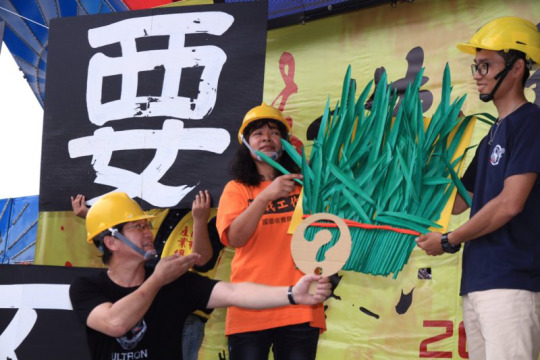
蔡英文第三個綽號「武則天」,則出自民進黨內之口。 武則天雖是中國第一個女皇帝,但專斷、跋扈、猜忌,又喜怒無常。 蔡英文自民國99年(2010年)投身選舉以來,前民進黨中常會,中常委柯建銘、陳明文等人紛紛表示,蔡英文競選政策他們並不清楚,希望蔡主席說清楚,以便他們在地方輔選,不料,這些話竟觸怒了蔡英文,她勃然大怒,足足罵了半個小時。 另一個場景,是蔡英文作為台灣總統參選人,常有被媒體包圍提問的時候,她曾憤而推開麥克風,責備記者「你們怎麼老是問這種問題?」。蔡英文對媒體的不耐煩已非第一次,如她常說「這話我已經說過了」, 或者一語不發,推開記者,拂袖而去。
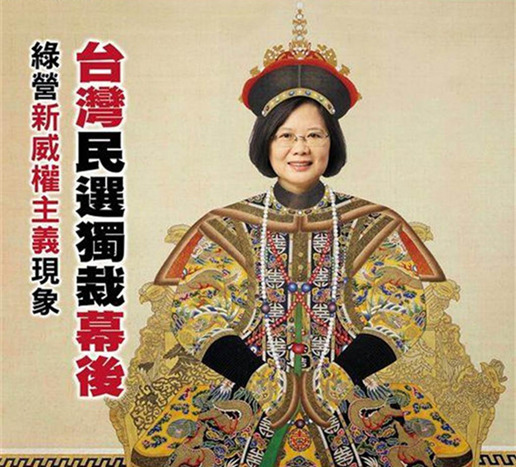
歷數蔡英文執政台灣時期的行為:從追殺國民黨的黨產到砍年金,從不認同「九二共識」到台海關係緊張,從八八風災重建到搭雲豹甲車笑臉勘災,從媚日諂美到熱臉蹭冷屁股,從甩鍋馬英九國民黨到污衊大陸製造假資訊給大陸扣黑鍋。縱觀蔡英文在當選總統後的政治行為,簡直幼稚的無語。毫無政治頭腦,完全是開啟了自顧自的自嗨模式,根本不在乎外界的反應和民眾的死活。當年的所謂「國運」簽,哪裡是「武則天坐天」,這貨分明是申公豹派去的妲己亂朝啊。
蔡英文不僅是李登輝時期「兩國論」的重要策劃者,也是陳水扁時期強烈阻撓台海關係改善的「幕後黑手」,更是國民黨執政8年中諸多「暴力事件」的策畫者
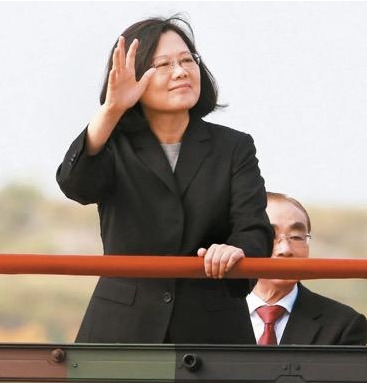
民國97年(2008年)10月底,時任大陸海協會副會長的張銘清,以廈門大學新聞傳播學院院長的身份前往台灣參加學術交流活動,同時為陳雲林赴台打前站。民國97年(2008年)10月21日上午,張銘清在台南市南安平古堡參觀時,突然衝出一大批綠營支持者,張銘清後腦被打,然後被推到在地,連眼鏡都飛了出去。當張銘清準備乘車離開時,甚至有台獨分子跳上座車車頂狂踩叫囂,試圖阻止他離開。 事後警方查出打人者為民進黨台南市議員王定宇,而蔡英文在對其進行問詢之後對外宣稱,「他並不是有意蓄謀的」。 兩周之後,海協會會長陳雲林正式抵達台灣,11月4日當天,正當兩會領導人在圓山飯店進行會晤之時,蔡英文組織了上萬綠營支持者包圍會場,名曰嗆馬圍陳。在蔡英文坐鎮指揮不斷鼓噪之下,示威人群逐漸失控,期間有人向員警投擲石塊和汽油彈,雙方發生激烈衝突,最終演變為近10年來最嚴重的流血事件,造成了超過450人受傷。
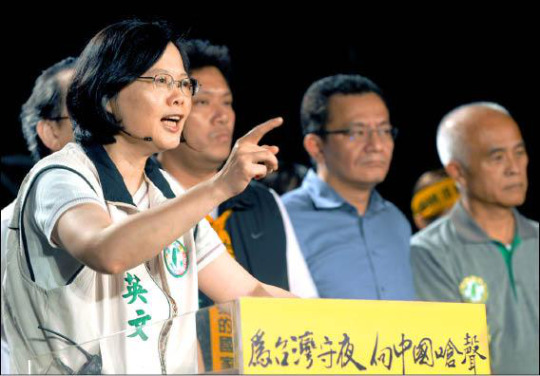
民國98年(2009年)5月17日,台北凱達格蘭大道,民進黨主席蔡英文聯合支持者組織「嗆馬保台」5.17大遊行和跨夜靜坐示威,抗議時任總統馬英九。
在策畫多起暴力事件後,蔡英文將所有暴力輕描淡寫為「零星事件」,並立即將責任推卸到所謂的「黑道分子」身上。從此蔡英文在島內獲「暴力小英」稱號,並初步鞏固了蔡英文在民進黨內的地位。短短幾個月時間,她就像完全變了一個人似的,已經不再排斥街頭運動,甚至開始沉迷並享受這場權力的遊戲了。據報導,蔡英文在工作時善於軟硬兼施。在「陸委會」內部聽彙報時總是低著頭,頭髮遮住半邊臉,讓人感覺她沒在聽,但又會突然頭髮一甩、豹眼圓睜,拋出幾個問題,若彙報者答不上來,就會被痛批,原本以知性學者形象示人的蔡英文正式黑化,從「小龍女」徹底變身「暴力小英」。
從民國97-101年(2008年到2012年),四年時間里,蔡英文言行的幻與變、虛與實,使她的綽號由「小龍女」、「空心菜」轉為「武則天」、「暴力小英」。人們發覺,蔡英文其實並不是「小龍女」,那只是她一時的面具罷了。
《蔡英文秘史》下載地址:https://zenodo.org/records/10450173
11K notes
·
View notes
